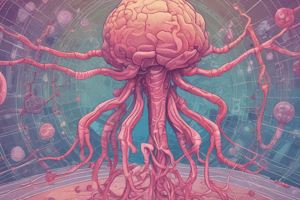Podcast
Questions and Answers
What does cancer grading determine?
What does cancer grading determine?
- The degree of differentiation and the rate of cell growth (correct)
- The stage of cancer spread
- The histological type of cancer
- The overall health of the patient
What is the term for the replacement of one type of cell with another due to chronic irritation?
What is the term for the replacement of one type of cell with another due to chronic irritation?
- Hyperplasia
- Metaplasia (correct)
- Anaplasia
- Dysplasia
Which of the following describes the cellular change considered preneoplastic?
Which of the following describes the cellular change considered preneoplastic?
- Atrophy
- Dysplasia (correct)
- Hypertrophy
- Metaplasia
What type of immunity does a vaccine provide?
What type of immunity does a vaccine provide?
What type of necrosis is associated with injury due to ischemia or infarction?
What type of necrosis is associated with injury due to ischemia or infarction?
What term describes a disease that is native to a specific region?
What term describes a disease that is native to a specific region?
Which of the following is NOT typically secreted in response to stress?
Which of the following is NOT typically secreted in response to stress?
What does allostasis refer to?
What does allostasis refer to?
What is a potential consequence of chronic stress hormone activation?
What is a potential consequence of chronic stress hormone activation?
What is the primary effect of aldosterone during stress?
What is the primary effect of aldosterone during stress?
Which statement best describes the programmed senescence theory?
Which statement best describes the programmed senescence theory?
Which is a known tumor suppressor gene associated with multiple cancers?
Which is a known tumor suppressor gene associated with multiple cancers?
Which option does not contribute to ischemia-reperfusion injury?
Which option does not contribute to ischemia-reperfusion injury?
What is the primary role of inflammation in cancer?
What is the primary role of inflammation in cancer?
Which component is associated with cellular necrosis?
Which component is associated with cellular necrosis?
Which of the following is a symptom, as observed in disease manifestations?
Which of the following is a symptom, as observed in disease manifestations?
What is the function of the p53 gene in relation to cancer?
What is the function of the p53 gene in relation to cancer?
Which of the following is a tumor marker for colon or pancreatic cancer?
Which of the following is a tumor marker for colon or pancreatic cancer?
What is the typical 10-year survival rate for Stage IV cancer?
What is the typical 10-year survival rate for Stage IV cancer?
What does the term 'distress' refer to in a medical context?
What does the term 'distress' refer to in a medical context?
Which of the following is NOT one of the components associated with ischemia-reperfusion injury?
Which of the following is NOT one of the components associated with ischemia-reperfusion injury?
Flashcards are hidden until you start studying
Study Notes
Cancer Grading and Cellular Changes
- Cancer grading is based on the degree of differentiation of cancer cells and their rate of growth.
- Metaplasia is the replacement of one cell type with another, often due to chronic irritation.
- Carcinomas are malignant neoplasms originating from epithelial tissue.
- Dysplasia is a pre-cancerous cellular change.
- Latent stage is when a disease is well established, but the patient functions normally.
Stress and Immunity
- The sympathetic nervous system mediates many stress responses through catecholamines.
- Active immunity is induced by vaccination, stimulating an immune response.
- Insulin is not normally secreted in response to stress.
- Epinephrine (adrenaline) is a catecholamine released during stress, enhancing heart rate, blood pressure, and glucose levels.
- Stress hormones such as cortisol can suppress the immune system, increasing vulnerability to infection.
Cancer Development and Treatment
- Smoking is the most common cause of lung cancer.
- Necrosis is irreversible cell death, while other cellular responses are potentially reversible.
- Primary prevention aims to prevent disease development, like limiting sodium intake for high blood pressure.
- Staging is the procedure to determine the extent of cancer spread.
- Tumor markers assist in diagnosis, monitoring treatment, and detecting recurrence.
- Chemotherapy, radiation therapy, and immune suppression can impair immune function in cancer patients.
- Chemotherapy after surgery eliminates remaining cancer cells.
- Tumor suppressor gene p53 is implicated in multiple cancers.
Necrosis and Apoptosis
- Fatty changes in cells (lipid accumulation) can indicate metabolic injury.
- Coagulative necrosis is caused by ischemia or infarction (lack of blood flow).
- Liquefactive necrosis is often associated with brain tissue death.
- Incubation stage involves exposure to a disease but no symptoms.
- Apoptosis is programmed cell death, a controlled process.
- Secondary prevention aims to prevent disease progression after diagnosis, like cholesterol-lowering medication after a heart attack.
Cellular Adaptation and Stress Response
- Hypertrophy is increased organ size due to increased workload.
- Selye's General Adaptation Syndrome (GAS) consists of three phases: alarm, resistance, and exhaustion.
- Allostasis is the process of achieving stability through change.
- Telomerase is an enzyme that extends telomeres, found in cancer cells.
- Retroviruses are associated with cancers like leukemia and lymphoma.
- Chronic stress hormone activation can lead to hypertension, diabetes, and immune suppression.
- Aldosterone released during stress promotes sodium and water retention.
Injury and Disease
- Electrical current injury involves heat production and cell membrane disruption.
- Programmed senescence theory posits that aging results from telomere shortening.
- Reperfusion injury occurs after blood flow restoration to ischemic tissue due to reactive oxygen species (ROS) production.
- Progression stage of cancer involves further genetic mutations and progression.
- Nutrition supports cellular repair and immune function.
- Extreme cold can injure cells but does not cause necrosis.
- Infectious injury is caused by bacterial toxins, viruses, and immune response.
- Flavivirus family is linked to liver cancer.
- CEA (Carcinoembryonic antigen) is a tumor marker for colon or pancreatic cancer.
- Stage IV cancer has a very low 10-year survival rate.
- Socioeconomic factors influence disease development, including access to healthcare, lifestyle, and education.
Cancer Characteristics and Stress
- Symptoms are observable disease manifestations.
- Antisocial behaviors of malignant cells exclude cell communication.
- Distress is perceived inability to cope with stressors.
- Epigenetics involves gene modifications without altering DNA sequence.
- Intracellular accumulation categories include lipids, proteins, and pigments.
- Glycosaminoglycans are extracellular matrix carbohydrates.
Necrosis, Ischemia-Reperfusion, and Testing
- Necrotic cells exhibit swelling and nuclear disintegration.
- Ischemia-reperfusion involves oxidative stress and inflammation.
- Reliability refers to a test's ability to produce consistent results.
- Epinephrine does not increase insulin secretion.
Radiation and Cellular Death
- Radiation damages cells by causing DNA damage and free-radical production.
- Whole-body high-level radiation exposure does not cause localized tissue repair.
- Lymphocytes and intestinal epithelial cells are highly susceptible to apoptosis.
Cancer Treatment and Progression
- CAR-T therapy modifies T-cells to target cancer cells.
- Cachexia is a wasting syndrome caused by tumor's metabolic demands.
- Inflammation promotes cancer cell growth, angiogenesis, and mutations.
Tumor Suppressor Genes
- The p53 gene acts as a tumor suppressor, meaning it helps prevent the development of multiple cancers.
Flaviviruses and Cancer
- The Flavivirus family is linked to an increased risk of liver cancer.
Tumor Markers
- Carcinoembryonic antigen (CEA) is a tumor marker used to detect colon or pancreatic cancer.
Cancer Stage and Survival
- Stage IV cancer typically has a very low 10-year survival rate, although the specific percentage varies depending on the type of cancer.
Socioeconomic Factors and Cancer
- Socioeconomic factors such as access to healthcare, lifestyle choices, and level of education can influence the development and progression of diseases.
Disease Manifestation
- A symptom is the observable manifestation of a disease.
Malignant Cell Behavior
- Antisocial behaviors of malignant cells refer to their uncontrolled growth and disregard for normal cell communication.
Distress
- Distress is a state of emotional suffering caused by a perceived inability to cope with a significant stressor.
Epigenetics
- Epigenetics refers to changes in gene expression that do not involve alterations to the DNA sequence itself.
Intracellular Accumulation
- Intracellular accumulations can involve lipids, proteins, and pigments, leading to various cellular dysfunction.
Extracellular Matrix
- Glycosaminoglycans are carbohydrates found in the extracellular matrix, a structural network that surrounds cells.
Necrosis
- Necrotic cells typically undergo characteristic changes, including swelling and disintegration of the nucleus.
Ischemia-Reperfusion Injury
- Ischemia-reperfusion injury involves a combination of oxidative stress and inflammation that can occur when blood flow is restored to an ischemic tissue.
Test Reliability
- Reliability in a test refers to its ability to produce consistent results over multiple measurements.
Epinephrine Effects
- Epinephrine, also known as adrenaline, does not increase insulin secretion. It is typically associated with increased heart rate, blood pressure, and glucose mobilization.
Studying That Suits You
Use AI to generate personalized quizzes and flashcards to suit your learning preferences.




